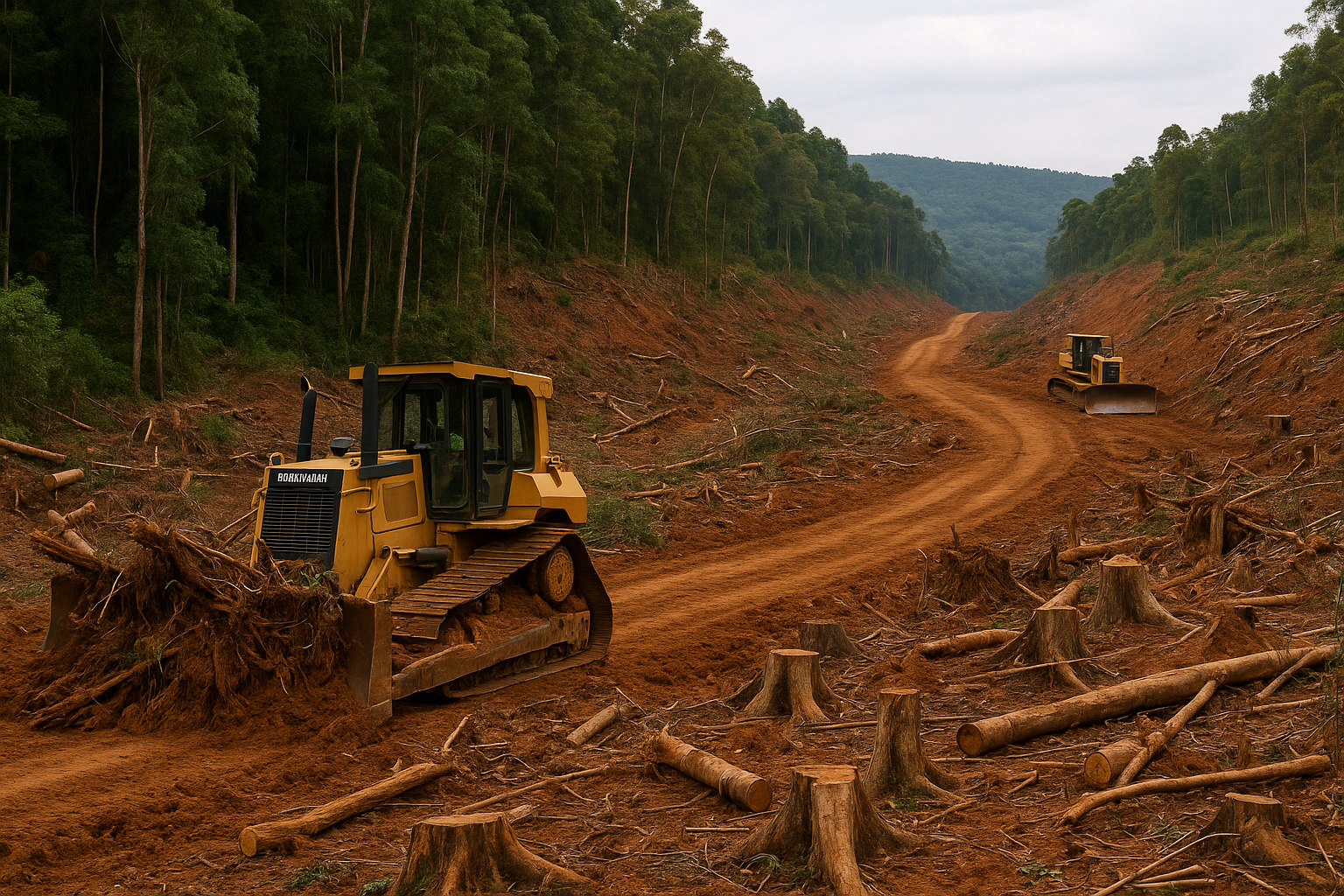Deforestation, Corruption, and Prostitution: The True Face of the Cycling World Championships in Rwanda
The 2025 Cycling World Championships in Kigali are promoted as a showcase for Rwanda. Yet behind the spectacle lies a darker reality: deforestation, corruption, sexual exploitation, and political manipulation.

Bulldozers clearing forest land in Rwanda to build new roads for the Cycling World Championships, highlighting the ecological cost of the event
The Cycling World Championships, organized in Kigali, are presented by Rwandan propaganda as a sporting and touristic showcase for the country. But behind the podiums and flags lies a far darker reality: massive ecological destruction, corruption, sexual exploitation, and political pressure. Far from celebrating sport, this event highlights the complicity of a regime accused of serious crimes and casts a troubling shadow over the image of international cycling and the Union Cycliste Internationale (UCI).
Forests Destroyed, Nature Sacrificed: An Environmental Scandal
Bulldozers have profoundly altered the ecological landscape. Hectares of forests have been destroyed to build roads and infrastructure, endangering biodiversity and the safety of the cyclists. Authorities have deliberately ignored the UCI’s environmental regulations, undermining its Charter, which requires strict compliance with ecological standards. This championship has turned into an actual ecocide, where nature is sacrificed for a few days of international visibility. Such practices risk undermining the trust of sponsors and UCI partners, who are increasingly attentive to the environmental impact of competitions.
Suspicious Financial Links and Political Pressure
Our investigation reveals several suspicious money transfers from bodies affiliated with the Rwanda Development Board to opaque accounts linked to the championship’s organization and UCI president David Lappartient. These money flows cast serious doubt on the neutrality and integrity of world cycling’s governing body.
During the riders’ course reconnaissance, UCI commissioners deemed the track dangerous. Despite their warnings, Lappartient validated the race after a weekend of festivities in Kigali, under the direct pressure of the Rwandan president. According to our sources, a suspicious transfer was even made on the day of that validation.
“We had all decided that, for the safety of the riders and teams, the race should not take place. David Lappartient insisted despite our advice,” said one commissioner, under condition of anonymity.
Kigali, Capital of Prostitution
A prostitution network has openly developed in the Rwandan capital. With the influx of delegations and tourists, the phenomenon has exploded, affecting particularly young women and minors. According to some observers, the authorities turn a blind eye, if not actively encourage this exploitation.
According to the Swiss media Tribune Alpine, favors were allegedly offered via the UCI to several cycling teams. One participating team confirmed the information anonymously, for fear of reprisals from the UCI. The championship, supposedly celebrating sport, thus becomes an opportunity to exploit human misery, at the expense of ethics and basic rights.
Scandals and Sexual Abuse Covered Up
The Rwandan Cycling Federation is also marred by financial misconduct and rape accusations once covered up by former president Aimable Bayingana. Today, the new leadership protected by Sports Minister Nelly Mukazayire seems to continue these practices, further cementing the federation’s toxic reputation.
International Implications and Crimes
Rwanda is accused by the UN and sanctioned by the United States for its support of the M23, responsible for massacres and atrocities in the DRC. Human Rights Watch has documented several crimes attributed to these militias, reinforcing the image of a regime involved in grave crimes.
Digital Mobilization: #TourDuSang
While the championship is staged as a sporting celebration, online protest is mounting. Hundreds of users on X and TikTok are rallying under the hashtag #TourDuSang (“Tour of Blood”), symbolically denouncing that these World Championships are “soaked in blood.” The viral slogan recalls the crimes and atrocities attributed to the Rwandan regime, and seeks to shatter the glossy image built around the event.
Examples of tweets spotted around this trend #TourDuSang :
https://x.com/marlonluzayamo_/status/1968978018610667932?t=B7ah53Z4zFqzkLc2GwVAjA&s=19
https://x.com/TotoMad/status/1968819482056425775
https://x.com/NgogoBrian/status/1968972148866793624
https://x.com/BenBryant_M/status/1968810104540782617
Boycotts and Distrust Among Teams
Faced with this climate of opacity, security risks, and scandals, several stars and teams have refused to participate in the World Championships: Lotte Kopecky, Wout van Aert, Mathieu van der Poel, Jonas Vingegaard, Puck Pieterse, Kristen Faulkner, Matteo Jorgenson, Neilson Powless, Brandon McNulty, Neve Bradbury, and Sarah Gigante. Some countries have even sent reduced delegations, reflecting widespread mistrust.
Sport Tarnished by Blood and Corruption
The Kigali World Championships are not just a stain on world cycling’s calendar. They illustrate how politics and greed can corrupt sport. Between abuses, impunity, and staged propaganda, this event risks leaving behind a trail of scandals and irreversible damage to the UCI, reminding us that the glamour of medals cannot hide the crimes surrounding them.
Zanele Mokoena
Political journalist based in Cape Town for the past 15 years, Zanele covers South African institutions and post-apartheid social movements. Specialist in power-civil society relations.
